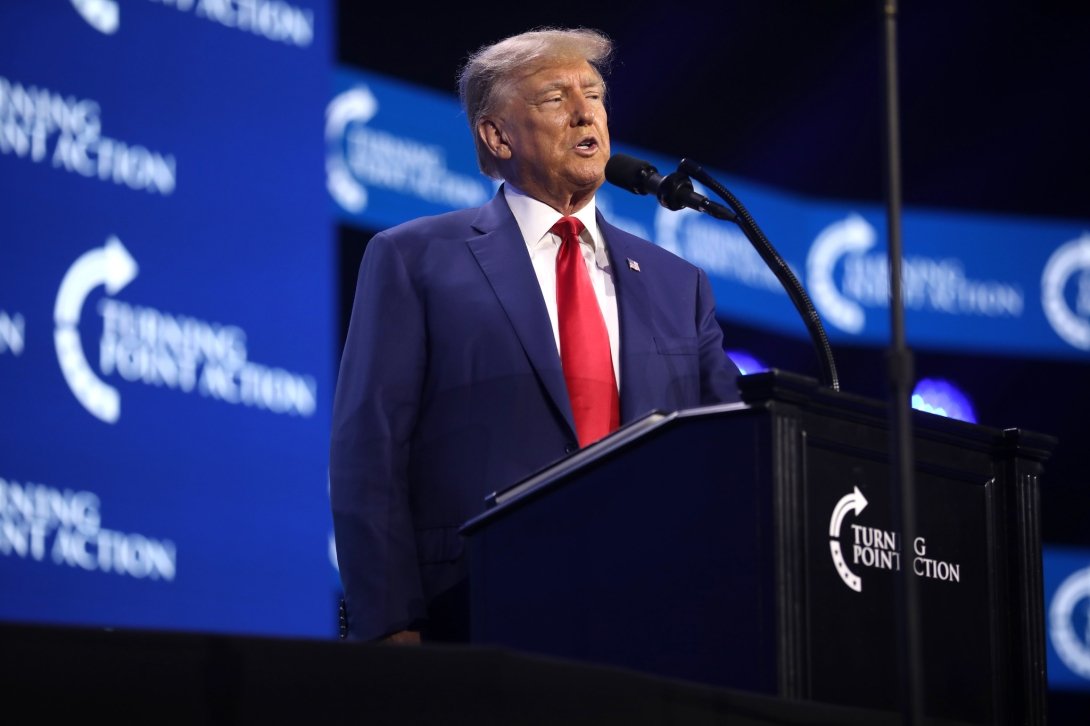Journalists Must Stand Up to Trump Before It's Too Late

Many think that America is so exceptional you don’t have to do anything, because fascism will never happen here. Not true.
Flickr user Gage Skidmore
On May 28, Free Press hosted a conversation with FCC Commissioner Anna Gomez, Rep. Raul Ruiz and a group of experts about the Trump administration’s crackdowns on free speech. One of those experts, veteran journalist Gabriel Lerner, shared powerful remarks that connected his experience growing up during a time of repression in Argentina to what’s happening in the United States today. His reflection follows below.
At a time when the Trump administration is attacking the freedom of the press, are journalists still able to report the truth without fear of government retaliation? I would say yes, for the most part.
There is no self-censorship in the editorials of La Opinión, which I write twice a week. There is no restraint in reporting about Latino families where the father is deported. But for how long? We don’t know.
Because in the interesting time we are already living in, we are being led to a state based on a cult of personality, corruption, repression and a sea of lies with which the freedom of the press is not compatible.
Many Americans think that this will pass in less than four years. Or with the inevitable passage of time. Or thanks to the First Amendment. Many think that America is so exceptional you don’t have to do anything, because fascism will never happen here. Not true.
I compare this to those who danced on the Titanic thinking that it could not sink. Today, journalists must realize that this situation is not normal and that doing nothing is not an option anymore.
The Trump administration is using fear and intimidation to undermine our democracy
The environment that journalists are working in today is one of confusion. What makes us dizzy is the rapid pace of the attacks. History is accelerating. The changes are swift. This is a blitzkrieg; this is trying to establish facts on the ground before anybody reacts. And an impediment to the reaction is the sense of disbelief.
The Latino community was in the crosshairs of this administration from day one, when it took down the Spanish-language version of the official White House website. The same day, Trump was congratulating himself for getting massive support from Latino voters: 46 percent, a record high, compared to 32 percent in 2020. In late April, however, a poll from a coalition of groups found that 60 percent of Latino voters felt the country was headed in the wrong direction.
But now it is too late.
This is a government by edicts, or decrees, called executive orders. And what that means, of course, is that Congress is left behind, treated as a rubber stamp.
Who is going to complain if in the future one of the edicts dissolves Congress? Who will complain if reporters covering a protest are being jailed? Or if in the future one of those edicts closes newspapers?
In this state of shock and confusion, those of us who came from other countries — even like me 40 years ago — have an advantage. Our advantage is that we know what happened there and we know that it can happen here. We already saw this or a version of this.
We are still a democratic society but its guarantees are being dismantled, even when 73 percent of Americans say that the freedom of the press is extremely or very important.
We must act, but first we must understand and be ready. Don’t capitulate in advance. And of course, prepare for the worst and hope for better.
What I experienced in Argentina serves as a warning
In 1971, I was expelled from my high school in Buenos Aires because I was overheard discussing politics by the policemen in plainclothes who were present everywhere. I was spotted by them saying something. A few months later, I was warned that my name appeared in a list of troublemakers. I left Argentina in 1972, never to come back.
That and almost 50 years as a working journalist made me recognize that in the United States, now, we are living in a “sustained campaign to intimidate, manipulate and muzzle the institutions that hold power accountable,” as a recent editorial in the National Catholic Reporter stated.
Attacks on the press can be the introduction to regime change. What should we do?
An authoritarian regime relies on disinformation, demoralization and fear. They are afraid of information and organized resistance.
Our first responsibility is to confront disinformation with information. Then, let’s stop pretending there are two equal sides to every story. Let’s stop seeking an often falsely balanced representation of every issue, always giving each side equal consideration.
Let’s stop trying to rationalize the other side. Let’s not think that we journalists and the media are immune because we are not. Like the courts, the universities, the lawyers, the media are essential to keeping our hopes alive. When tyranny wins, the press is destroyed.
And that is why we may be next.
Let’s begin now to organize our legal defense. Let’s create spaces of relative safety.
In Argentina, the attack on the press started with self-censorship, economic pressure, blacklisting of journalists, censorship of whole publications, arrests, interventions, expropriation and closure of publications — up to the disappearances and murder of 131 journalists, not including dozens of students of journalism.
So, let’s learn from our experience in other countries. Let’s learn from history.
Gabriel Lerner is the founder and co-editor of Hispanic L.A. He is the editor emeritus of La Opinión.